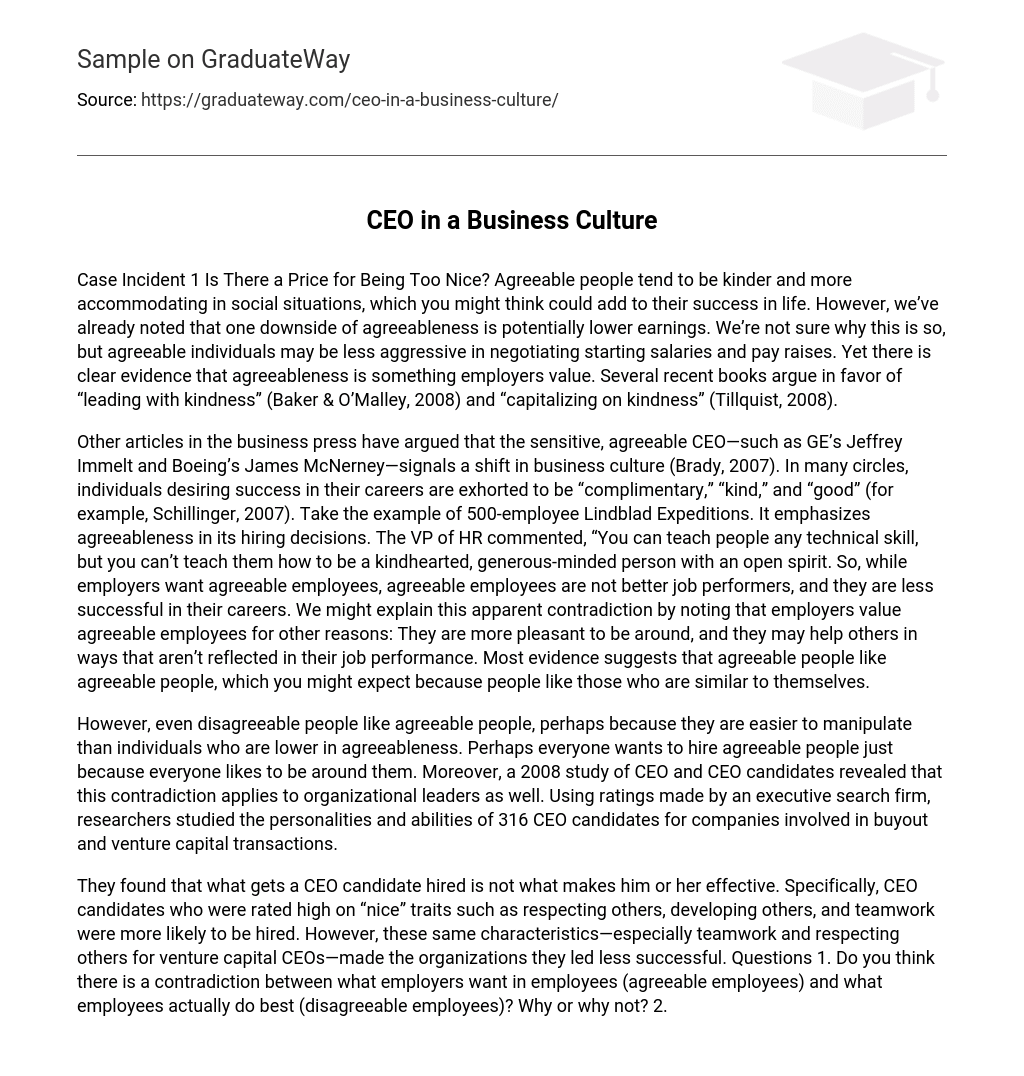Case Incident 1 Is There a Price for Being Too Nice? Agreeable people tend to be kinder and more accommodating in social situations, which you might think could add to their success in life. However, we’ve already noted that one downside of agreeableness is potentially lower earnings. We’re not sure why this is so, but agreeable individuals may be less aggressive in negotiating starting salaries and pay raises. Yet there is clear evidence that agreeableness is something employers value. Several recent books argue in favor of “leading with kindness” (Baker & O’Malley, 2008) and “capitalizing on kindness” (Tillquist, 2008).
Other articles in the business press have argued that the sensitive, agreeable CEO—such as GE’s Jeffrey Immelt and Boeing’s James McNerney—signals a shift in business culture (Brady, 2007). In many circles, individuals desiring success in their careers are exhorted to be “complimentary,” “kind,” and “good” (for example, Schillinger, 2007). Take the example of 500-employee Lindblad Expeditions. It emphasizes agreeableness in its hiring decisions. The VP of HR commented, “You can teach people any technical skill, but you can’t teach them how to be a kindhearted, generous-minded person with an open spirit. So, while employers want agreeable employees, agreeable employees are not better job performers, and they are less successful in their careers. We might explain this apparent contradiction by noting that employers value agreeable employees for other reasons: They are more pleasant to be around, and they may help others in ways that aren’t reflected in their job performance. Most evidence suggests that agreeable people like agreeable people, which you might expect because people like those who are similar to themselves.
However, even disagreeable people like agreeable people, perhaps because they are easier to manipulate than individuals who are lower in agreeableness. Perhaps everyone wants to hire agreeable people just because everyone likes to be around them. Moreover, a 2008 study of CEO and CEO candidates revealed that this contradiction applies to organizational leaders as well. Using ratings made by an executive search firm, researchers studied the personalities and abilities of 316 CEO candidates for companies involved in buyout and venture capital transactions.
They found that what gets a CEO candidate hired is not what makes him or her effective. Specifically, CEO candidates who were rated high on “nice” traits such as respecting others, developing others, and teamwork were more likely to be hired. However, these same characteristics—especially teamwork and respecting others for venture capital CEOs—made the organizations they led less successful. Questions 1. Do you think there is a contradiction between what employers want in employees (agreeable employees) and what employees actually do best (disagreeable employees)? Why or why not? 2.
Often, the effects of personality depend on the situation. Can you think of some job situations in which agreeableness is an important virtue? And in which it is harmful? 3. In some research we’ve conducted, we’ve found that the negative effects of agreeableness on earnings is stronger for men than for women (that is, being agreeable hurt men’s earnings more than women’s). Why do you think this might be the case? Source: T. A. Judge, B. A. Livingston, and C. Hurst, “Do Nice Guys—and Gals—Really Finish Last? The Joint Effects of Sex and Agreeableness on Earnings,” working paper, University of Florida, 2009; S.
N. Kaplan, M. M. Klebanov, and M. Sorensen, “Which CEO Characteristics and Abilities Matter? ” working paper, University of Chicago Graduate School of Business, 2008 http://faculty. chicagobooth. edu/steven. kaplan/research/kks. pdf”faculty. chicagobooth. edu/steven. kaplan/research/kks. pdf; W. F. Baker and M. O’Malley, Leading with Kindness: How Good People Consistently Get Superior Results. New York: AMACOM, 2008; K. Tillquist, Capitalizing on Kindness: Whey 21st Century Professionals Need to Be Nice. Pompton Plains, NJ: Career Press,





